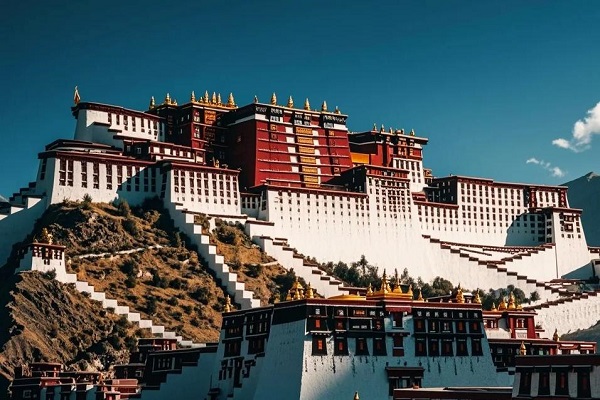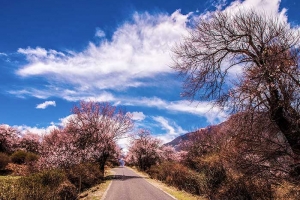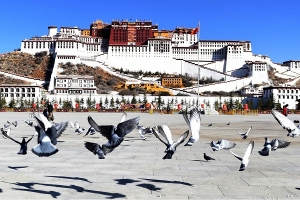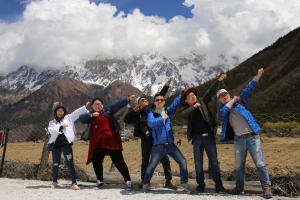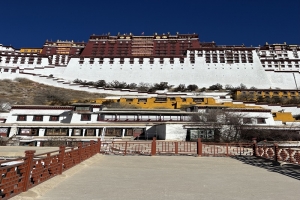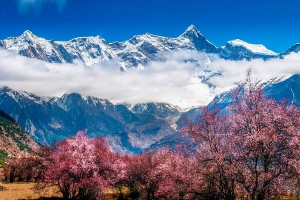Tibet is an alluring destination for adventurers, spiritual seekers, and cultural enthusiasts. Its majestic landscapes, ancient monasteries, and unique Tibetan Buddhist culture make it a dream location for many. However, unlike most parts of the world, foreigners cannot freely travel to Tibet on their own. Instead, they must join group tours organized by travel agencies like us at Journey2Tibet. Why is this the case? Let’s explore the reasons behind these restrictions and how group tours offer the best way to experience this enchanting land.
The Tibet Travel Permit (TTP) is a crucial document required for all foreign visitors to enter and travel within the Tibet Autonomous Region (TAR). Issued by the Tibet Tourism Bureau, the TTP is not a simple visa that one can obtain independently. It must be arranged through a registered travel agency like ours as part of an organized tour. Without this permit, foreigners cannot board flights or trains to Tibet or access any part of the region. The permit’s purpose is multifaceted: it regulates the number of visitors, ensures safety, and helps preserve the unique cultural and environmental landscape of Tibet. Additionally, the process of acquiring a TTP involves submitting passport details, a valid Chinese visa, and a detailed itinerary—all of which we handle for you. This requirement effectively makes independent travel to Tibet impossible.

The Restrictions: Why Independent Travel is Prohibited
Foreigners are not permitted to travel to Tibet independently due to a combination of political, cultural, and logistical factors. Here are the primary reasons:
Tibet holds significant political and cultural importance within China. Since the 1950s, the region has been under the administration of the People’s Republic of China. Due to historical and political sensitivities, the Chinese government exercises strict control over access to Tibet to ensure stability and security in the region.
Tibet’s unique cultural and religious heritage is central to its identity. The government imposes restrictions to regulate tourism and prevent potential harm to fragile ecosystems and cultural sites. Controlled access ensures that visitors do not inadvertently disrupt local customs or cause damage to sacred locations.
Tibet’s remote location and high-altitude environment present significant logistical challenges for travellers. With limited infrastructure and emergency services, the authorities aim to ensure that tourists are well-supported and accompanied by experienced guides who can handle potential issues such as altitude sickness or transportation difficulties.
Certain areas in Tibet are considered politically sensitive or strategically important. By mandating that foreigners travel in organized groups, the government can monitor and manage tourist activities to ensure compliance with regulations and maintain security.
To enter Tibet, foreigners need a Tibet Travel Permit (TTP) issued by the Tibet Tourism Bureau. This permit is only available through registered travel agencies, making independent travel impossible. Additional permits may be required for specific regions, further underscoring the need for organized tours.
Why Group Tours Are the Ideal Solution
While the restrictions may seem daunting, joining a group tour through a reputable travel agency like Journey2Tibet offers several benefits that enhance your Tibetan experience:
We handle all the necessary permits and paperwork, saving you the headache of navigating complex administrative procedures. From the Tibet Travel Permit to region-specific permissions, we ensure you’re fully compliant with regulations.
Our group tours are led by knowledgeable guides who provide invaluable insights into Tibetan culture, history, and spirituality. These experts can answer your questions, offer local perspectives, and ensure you respect cultural norms during your visit.
Travelling in Tibet’s high-altitude environment can be challenging. We provide acclimatization advice, reliable transportation, and support in case of medical issues. This ensures a safer and more enjoyable trip.
We design itineraries that balance must-see attractions with opportunities to experience the authentic culture of Tibet. From iconic sites like the Potala Palace and Jokhang Temple to lesser-known gems in remote villages, our group tours cover it all.
Our group tours bring together like-minded travellers, offering opportunities to forge connections and share unforgettable memories. Whether you’re trekking to Everest Base Camp or exploring the serene Yamdrok Lake, the camaraderie of group travel adds to the experience.
By travelling with us, you contribute to more sustainable tourism practices. We work closely with local communities, ensuring that your visit benefits the people and preserves the environment.
How to Choose the Right Travel Agency
Selecting a reliable travel agency is crucial for a seamless Tibetan adventure. Here’s why Journey2Tibet is your best choice:
Free and guaranteed Tibet Travel Permit (TTP) application, we only need your application materials 30 days in advance.
We have a proven track record of organizing tours in Tibet.
Our team includes Tibetan guides who offer authentic insights and cultural immersion.
We provide clear information about costs, permits, and itineraries.
We cater to your interests, whether you prefer cultural exploration, adventure, or spiritual journeys.
We are committed to sustainable tourism and the preservation of Tibetan heritage.
Embrace the Unique Journey
While the restrictions on independent travel to Tibet may initially seem limiting, they are designed to protect the region’s cultural and environmental integrity. By joining a group tour with Journey2Tibet, you gain access to an unparalleled journey through one of Earth’s most mystical and awe-inspiring destinations.
Our group tours not only ensure compliance with regulations but also provide the structure and support needed to fully appreciate Tibet’s beauty and significance. So, rather than seeing the restrictions as obstacles, embrace them as an opportunity to explore Tibet in a way that respects its traditions and preserves its splendour for future generations.

